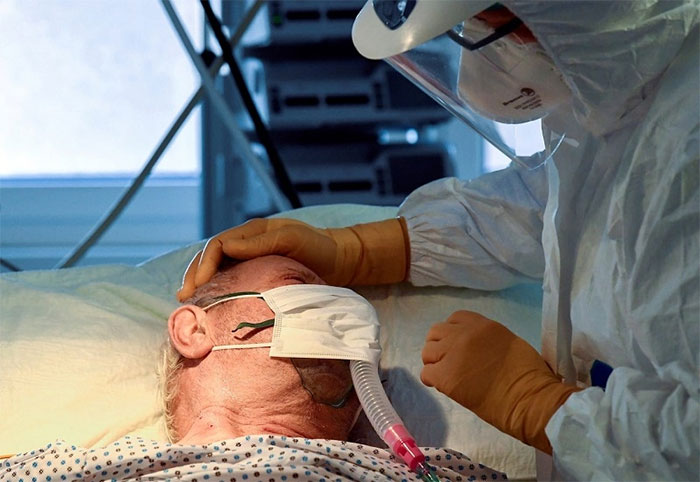Three blood markers accurately predict the risk of death from Covid-19
The study, published Thursday, May 15, in the journal Nature Machine Intelligence, says scientists have created a computer model based on three measurable biological markers in a drop of blood to project. Predict whether the patient has a severe history of death before 10 days, with an accuracy of at least 90%.
The authors suggest that these three clues play an important role in classifying cases of patients requiring immediate medical attention. Their model also "provides a simple and intuitive clinical trial to accurately and quickly quantify the risk of death".

Medical personnel are on duty next to a Covid-19 patient in the intensive care unit at Circolo Hospital in Varese, Italy on April 9. (Photo: Reuters)
In Wuhan, China, research shows that 14-19% of patients with Covid-19 are seriously ill. Among severe cases, mortality is higher than 60%.
To identify similarities between these severe cases, the researchers analyzed blood samples taken continuously from 485 Covid-19 patients at Tongji Hospital in Wuhan, China, from January 10. to February 18. They checked for kidney, heart and blood problems. These patients later survived or died. From there, scientists use machine learning algorithms to search for biological models.
The results show that the following indicators can predict whether a patient has a higher risk of death than other infected people:
- High concentration of lactic dehydrogenase (LDH) enzyme . This is related to lung damage and the type of tissue disruption that occurs during pneumonia.
- Lymphopenia , the term for low lymphocyte level. White blood cells protect the body against invading pathogens.
- An increase in highly sensitive C-reactive proteins, or hs-CRP for short. This phenomenon shows inflammation in the lungs.
Using those indicators, the computer model can predict what happened to patients 10 days in advance of their clinical results.
"Any hospital can easily test for three key signs, including LDH, lymphocytes and hs-CRP. For crowded and under-resourced hospitals, this simple computer model has help quickly prioritize severe patients, " the researchers write.

Doctor examines a Covid-19 patient at a hospital in Wuhan, Hubei Province, China. (Image: Getty Images).
Another study published this week took a similar approach, identifying exactly 10 biomarkers that can help doctors assess each patient's risk level. The study, published in the Journal of the American Medical Association on May 13, suggested using these signs to determine the likelihood that Covid-19 patients hospitalized would be seriously ill and taken into care. intensive care unit, ventilator, or death.
The researchers reviewed medical records from 1,590 patients treated at 575 hospitals across China between November 21 and January 31.
Two of the biomarkers in this study overlap with the recommendations in the study: high LDH levels and low lymphocyte levels.
The remaining eight factors predict other risk factors including history of cancer, preexisting medical conditions, old age, difficulty breathing, coughing up blood, unconsciousness, abnormal chest x-rays and high levels of bilirubin (a substance in the blood, high levels of liver damage).
The researchers used these 10 indicators to develop an online calculation tool to predict the risk of Covid-19 patients on admission. The prediction tool could allow physicians and medical staff to optimize hospital resources, the study authors wrote.
"If the patient's risk risk estimates are low, clinicians may choose to follow-up, while high risk estimates may support intensive treatment or intensive care access , " they said.
- 5 celebrities soon accurately predicted their death
- Blood tests can predict pregnant women giving birth prematurely
- A strange phenomenon caused the sudden death of Covid-19 patient
- Breast milk can help detect cancer risk early
- Predict life through blood index
- Tests help predict life expectancy from birth
- Death test
- Can accurately predict human life expectancy
- Stents increase the risk of death twice
- Abdominal fat increases the risk of death
- Why is the mortality rate for Covid-19 virus in Iran so alarming?
- Predict death for 30 days
 Chinese doctors have created medical masks that cover only the nose for convenience of eating and drinking
Chinese doctors have created medical masks that cover only the nose for convenience of eating and drinking Scientists have found a way to help you regrow new teeth after only 2 months
Scientists have found a way to help you regrow new teeth after only 2 months Do non-stick pans cause cancer? What alternatives are there?
Do non-stick pans cause cancer? What alternatives are there? Blisters around the body: Causes, symptoms and treatment
Blisters around the body: Causes, symptoms and treatment Positive trial results of drug that 'melts' cancer tumors
Positive trial results of drug that 'melts' cancer tumors  Tips to reduce loss of appetite during breast cancer chemotherapy
Tips to reduce loss of appetite during breast cancer chemotherapy  WHO recommends not using plasma to treat COVID-19 patients
WHO recommends not using plasma to treat COVID-19 patients  Smart bandages help patients recover from a distance
Smart bandages help patients recover from a distance  The first trial with a drug to treat long-lasting Covid-19 sequelae
The first trial with a drug to treat long-lasting Covid-19 sequelae  Close-up of modern equipment and machinery inside the largest Covid-19 field hospital in Hanoi
Close-up of modern equipment and machinery inside the largest Covid-19 field hospital in Hanoi 